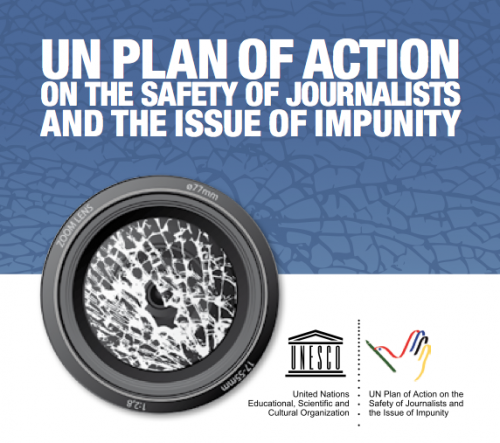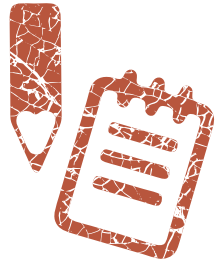UN Plan of Action on the Safety of Journalists and the Issue of Impunity
by UNESCO / October 29, 2013 / No comments

More than 600 journalists, media workers and social media producers have been killed in the last ten years.
A silenced journalist mutes the voice of the people and curbs their right to know. When a journalist is killed, the dramatic message sent to the public is: “Take note, no one should speak out when bad things are happening.”
The killings not only brutally eliminate an individual journalist’s right to freedom of expression – they also put a symbolic gag around the same right for every citizen. The result is a society that cannot make informed decisions and where fearful citizens resort to self-censorship.
To put an end to violence against journalists, the United Nations has developed the UN Plan of Action on the Safety of Journalists and the Issue of Impunity.
Every week a journalist loses his or her life for bringing news and information to the people. The UN Plan of Action draws the full United Nations system into a coordinated and harmonised programme to stop the killing of journalists. It does so in close co-operation with governments, media, professional groups and civil society. It supports governments to develop laws on safeguarding journalists and to play an active role in preventing attacks and intimidation. It promotes awareness-raising across the whole of society so that citizens can understand the wide-ranging negative effects when a journalist’s right to freedom of expression is curtailed or terminated.

The majority of victims are local media workers covering local stories. While there is a global side of action to the UN Plan, it is especially at local and national levels where implementation will be focused – through the combined efforts of UN bodies in a country team, and through promoting the alignment of all stakeholders in that territory.
In most cases, murdered journalists are covering corruption and other illegal Activities such as organized crime. The UN Plan is part of how UN bodies are working to support those countries which seek to combat corruption. When journalists are safe to expose fraud and embezzlement, their societies at large are better able to fight this major obstacle to development.
There is evidence that in the majority of cases, journalists receive threats prior to being killed. The UN Plan promotes preventive mechanisms and standards, such as disseminating good practices from countries where governments have succeeded in providing timely and effective protection. The Plan also includes steps to support the monitoring of the safety of journalists, including sharing up-to-date information amongst all actors in the field.
More than 90% of killings of journalists go unpunished. When journalists can be killed without repercussions, the instigators simply become emboldened. The Rule of Law, meaning that no one should enjoy impunity for crimes, is an important aspect of the UN Plan. Governments are called upon to comply with international resolutions and ensure full judicial process in response to the murder of a journalist. The Plan offers UN help in strengthening police investigations and court proceedings, and it affirms that there should be no statute of limitations on persons guilty of crimes against freedom of expression.
Attacks on professionals also include abduction, hostage-taking, harassment, intimidation, and illegal arrest, among others. The UN Plan promotes safety provisions for journalists such as training courses in safety and e-security, availability of healthcare and life insurance, and real-time emergency response mechanisms. The Plan also seeks to strengthen the safety of journalists in conflict zones, to decriminalize defamation offenses, and to encourage adequate remuneration for both full-time and freelance employees.
Women journalists are increasingly becoming victims of sexual harassment and rape. Many criminals who harm journalists are especially aggressive when the journalist in their sights happens to be female. A gender-sensitive approach is taken throughout the work of the UN Plan, and specific actions for women journalists are incorporated.

The aim of the UN Plan of Action on the Safety of Journalists and the Issue of Impunity is to work toward the creation of a free and safe environment for journalists and media workers in both conflict and non-conflict situations, with a view to strengthening peace, democracy and development worldwide.
The UN Plan of Action is a new UN-wide initiative, coordinated by UNESCO to provide an overarching framework for the UN system to work together with all relevant stakeholders, including national authorities and the various national, regional and international organizations in order to create a safe environment for journalists, media workers and social media producers and also to combat impunity for crimes against them.
The UN Plan of Action is the result of an extensive, worldwide consultation with Member States, media, professional associations and NGOs.
The UN Plan is a historic chance to make a difference to journalists’ safety and freedom of expression in society. Individuals and organizations can do many things to complement the UN Plan by intensifying their voices and activities in favour of journalists’ safety. The combined impact of all this action will help bring the world closer to a culture of peace in which every person is safe to speak without fear, and where no one is deprived of a chance to hear the testimony of others.




